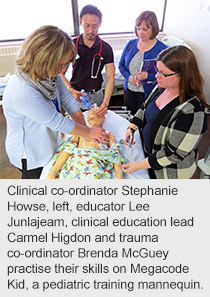
May 21, 2015
Story by Kerri Robins; Photo by Crystal Rose
 FORT McMURRAY — The newest teacher at the Northern Lights Regional Health Centre here is a six-year-old who works for free.
FORT McMURRAY — The newest teacher at the Northern Lights Regional Health Centre here is a six-year-old who works for free.
Meet the ‘Megacode Kid,’ a pediatric medical training mannequin designed to represent a young child. It arrived at the Clinical Education Department this spring.
“It’s great having the training mannequin on staff,” says registered nurse Carmel Higdon, clinical education lead at the centre, “because it’s a huge help to physicians, nurses and ultimately patients, by providing training and practice for our staff’s clinical skills,”
“Not only can staff practise, but they can ask questions and learn new skills while getting used to what a real situation would be like.”
Thanks to a generous donation from the Fort McMurray Shrine Club to the Northern Lights Health Foundation, the hospital bought the Megacode Kid for $6,185.
The mannequin simulates a real patient complete with all the vital signs, including blood pressure and heart rate, allowing staff to practise emergency defibrillation and drug administration skills.
The educator monitoring the event can also play with Megacode Kid’s vital signs during the scenario as an additional challenge.
Children present differently than adults in emergencies. For example, their vital signs include lower blood pressure, higher pulse and a smaller airway, so Megacode Kid is instrumental in training staff in advanced pediatric procedures.
Higdon says she’s excited to introduce staff to the new ‘kid’ on the block.
“We use the mannequin to simulate pediatric emergencies that teach a wide range of advanced pediatric lifesaving skills. For example, a child experiencing a severe asthma attack or an above-average rapid heart rate,” says Higdon.
“Providing training event scenarios ultimately benefits our patients by helping us provide quality care gained by keeping our medical knowledge current. And the scenarios are specific, so participants can build on their critical-thinking skills.”
Each event begins with a brief description of the ‘child’s’ illness or injury.
Held in the education lab, staff can also ask questions and gather information during the initial assessment. An educator monitors the scenario and how the staff assess and manage the simulated emergency.
“The events are designed from specialty courses based on the learning needs of participants,” adds Higdon. “Many staff are involved in designing the events, including physicians who actively participate in the scenarios.”
Susanne Chaffey, Executive Director of the Northern Lights Health Foundation, says she’s grateful to the Fort McMurray Shrine Club for its donation.
“We’d like to extend a huge thank-you to the shrine club for its tremendous support of health care in our region,” she says.
“This gift will have immense impact on our staff in helping them learn and practise so they can continue providing the quality care our children deserve.”
For more information, please visit northernlightshealthfoundation.ca